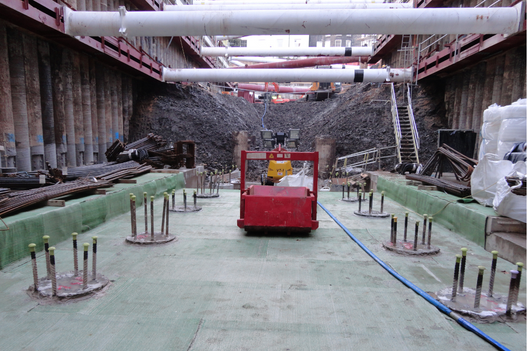 BS 8102:2022 And The Importance of Project Collaboration
BS 8102:2022 And The Importance of Project CollaborationThe Code of Practice for waterproofing of below ground structures, British Standard BS 8102, has been updated to incorporate current practices and new materials, provide greater clarity and ultimately deliver higher quality waterproofing designs and installations. Here Martin Radford, our Commercial Sales Leader, looks at why there is also now a greater need for collaboration at every stage of the project.
BS 8102 was last revised in 2009 and since then there have been advances in waterproofing, including new technologies and systems as well as enhanced best practice approaches. The new edition provides improved guidance on the role of the waterproofing specialist and includes clearer direction on criteria for selecting a suitable specialist. There is also a focus in the updated Code of Practice on ensuring that waterproofing solutions are as robust as possible.
However, one of the most significant themes throughout is the drive for greater collaboration with regard to the waterproofing strategy between all members of the project team at every stage.
At RIW, this is an approach we have long advocated. We know that a close working relationship between all members of the team will ensure a smooth process from design to build to handover. While warranties and guarantees are an important part of the construction industry, we believe it is just as important to We believe the aim should be to collectively mitigate and manage risk throughout at all stages of the project through due diligence.
This is why we have developed our 360° Design Advantage Plus service. It has been designed specifically for large or complex projects and is founded on the consultative approach we take with all projects, drawing on our decades of experience on buildings of every type. We have worked on a wide range of project types from individual high-end residential projects to major multi-million pound developments such as the British Museum extension and The Francis Crick Institute building. We work in cooperation with architects, engineers, contractors and end clients to simplify the design, specification and installation of waterproofing.
On major projects there are three key phases and at each of these the team must collaborate in different ways to ensure success.
Design
During the initial stages of the project, the waterproofing specialist must gain an understanding of the client’s expectations and requirements to ascertain how this will influence the waterproofing strategy. The site evaluation also forms an important part of this phase. Under the updated Code of Practice there is a wider range of factors identified that could impact the waterproofing design and therefore must be addressed. This includes the effects of climate change, burst water mains, flooding and defective Sustainable Urban Drainage systems (SUDs). Mitigating these risks is best achieved by working together as a project team.
Constructability
Prior to work on site commencing, the waterproofing specialist will need to work with the project delivery team and provide support, refine the proposed strategy and ensure the waterproofing can be implemented correctly as the project progresses.
Project Delivery
Throughout the construction phase, the waterproofing specialist should work with all parties involved in the delivery. For example, they will be able to develop a full installation programme, method statements, bespoke drawings and help ensure operative best practice. In BS 8102:2022 there is an increased focus on the need to protect waterproofing systems during all phases of construction. This requires cooperation with all those working on site, including following trades, to ensure the systems are not damaged.
A successful waterproofing strategy, perhaps more than any other area of a building’s design, requires the right approach from the specialist partner selected, as well as cooperation from all parties involved. It is also essential that the waterproofing specialist has the correct knowledge and experience for the type of project in question, something which has been made clear in the updated version of BS 8102.
To find out more about the updates to BS 8102 and what these changes mean for project teams download our whitepaper here.



